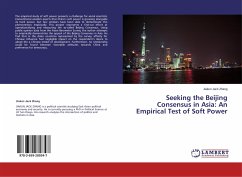
The institutional dynamics of consensus and conflict
Consensus democracy, corporatism and socio-economic policy-making and performance in twenty developed democracies (1965-1998)
Versandkostenfrei!
Versandfertig in 6-10 Tagen
52,99 €
inkl. MwSt.

PAYBACK Punkte
26 °P sammeln!
This study analyses the relations between different types of institutional arrangements and their impact on socio-economic policy-making and performance. Consensus based versus conflict based institutional arrangements are contrasted. Institutional arrangements of consensus versus majoritarian democracy are used in the case of political decision-making. Institutional arrangements of corporatism compared to pluralism are used in the case of policy concertation among organised interests. Do these consensual institutions make a difference? The comparative analysis of this study shows that the imp...
This study analyses the relations between different types of institutional arrangements and their impact on socio-economic policy-making and performance. Consensus based versus conflict based institutional arrangements are contrasted. Institutional arrangements of consensus versus majoritarian democracy are used in the case of political decision-making. Institutional arrangements of corporatism compared to pluralism are used in the case of policy concertation among organised interests. Do these consensual institutions make a difference? The comparative analysis of this study shows that the impact of institutions on performance varies cross-nationally and across time. The case analysis shows that the role of actors is important, but also variable across the cases. There is not found a one-way relationship between institutions and performance. Instead of institutions, it appeared that contextual variables largely shape macro-level performance. National configurations of institutions and actors contribute to socio-economic performance but appear amendable if and when performance is low.












